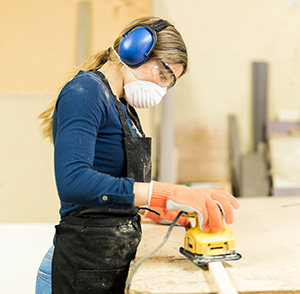Controlling Asthma Triggers: Irritants
Irritants are things in the air that can trigger symptoms in some people with asthma. Below are some common irritants. Some are tiny particles and others are dissolved in the air. You will also find tips to help you stay away from them.
Smoke
This includes cigarettes, cigars, e-cigarettes, pipes, barbecues, outdoor campfires, and fireplaces.
-
Don’t smoke. And don’t let people smoke in your home or car. Also, don't use e-cigarettes.
-
When you travel, ask for smoke-free rental cars and hotel rooms.
-
Stay away from fireplaces and wood stoves. If you can’t, sit away from them, and make sure the smoke goes outside.
-
Don’t burn incense or use candles.
-
Move away from smoky outdoor cooking grills.
Smog
This is from car exhaust and other pollution.
-
Read or listen to local air quality reports. These let you know when air quality is poor.
-
Stay indoors as much as you can on smoggy days. If possible, use air conditioning instead of opening the windows. Air conditioners filter the air. The filter needs to be cleaned regularly.
-
In your car, set air conditioning to use air only inside the car. This will let in less pollution.
Strong odors
These are from air fresheners, deodorizers, and cleaning products. They are also from perfumes, deodorants, and other beauty products. Strong odors also come from incense, candles, insect sprays, and other household sprays. The chlorine in swimming pools can affect some people.
-
Use products with no scent. An example is scent-free deodorant or body lotion.
-
Don't use products with bleach and ammonia for cleaning. Try making a cleaning solution with white vinegar, baking soda, or mild dish soap.
-
Use exhaust fans while cooking. Or open a window if you can.
-
Don't use perfumes, air fresheners, potpourri, and other scented products.
Other irritants
These are dust, aerosol sprays, and fine powders.
-
Wear a mask while doing tasks, such as sanding, dusting, sweeping, and yard work. Make sure any indoor work area is well-ventilated. Open doors and windows when doing these tasks.
-
Use pump spray bottles instead of aerosols.
-
Pour liquid cleaners instead of spraying them. For example, don't spray a window with cleaner. Pour some on a rag or cloth instead.
 |
| Wear a mask when working around fine particles, like dust or residue from sanding. |
Quick-relief inhalers
If you have a quick-relief inhaler, carry it with you at all times. If you can’t stay away from an area with irritants, watch for symptoms. If you have symptoms, leave the area and use your quick-relief inhaler as directed. Always keep your asthma action plan updated and with you to control your asthma.
Online Medical Reviewer:
Chris Southard RN
Online Medical Reviewer:
Jessica Gotwals RN BSN MPH
Online Medical Reviewer:
Rajadurai Samnishanth Researcher
Date Last Reviewed:
4/1/2024
© 2000-2024 The StayWell Company, LLC. All rights reserved. This information is not intended as a substitute for professional medical care. Always follow your healthcare professional's instructions.